Get posts by email
Homeschool Report Card: Math
March 31, 2010
Celine just recently completed Gamma level of Math U See so I thought I'd celebrate by sharing how we teach our children math. Woo-hoo, big party.
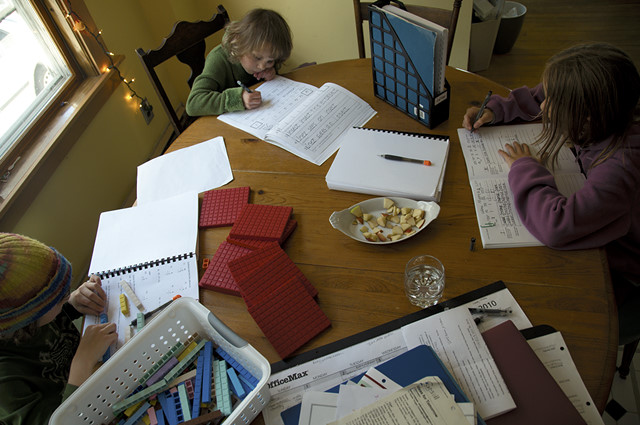
A series of homeschool posts coming your way
After talking about math I plan follow up with a few more posts to explain how we help our children learn "the academic basics" during their early homeschooling years. So far I have history/geography, writing and reading planned in addition to this post on math.
{Post Script: you can read those posts here - Studying the World Through Reading and Creative Play and Learning to Read Part One & Part Two.}
I consider these subjects to be the academic core. Not to say they are more important than others, they are not (except for maybe reading). And in terms of actual time spent studying something we spend more time learning about the outdoors than we do studying math for example. But these are the subjects that new homeschoolers or those considering homeschooling wonder "how do I teach (fill-in-the-blank) to my young child".
You'll notice science is missing from my list. I don't think I have time to address that anytime soon so I didn't want to make any commitments. I also don't see science as a foundational area of study during the early years.
Not to say we don't study science. We do. You can read examples of our science studies here and here. I just don't spend time planning how to study science, it simply happens in every day life and my husband also does a lot of inspirational science related activities in the evenings with the kids. The other subjects however I do spend time planning for and as such have given them more thought.
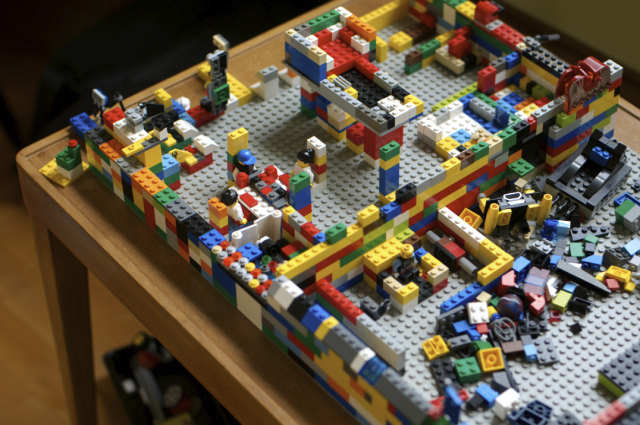
Lego: a beautiful marriage of science, math and fun
How we study math
I'd like to jump into this without re-iterating my whole educational philosophy which you can read about here, here and here. But I will say this, I believe it's totally possible to learn math in a completely "natural" setting, sans worksheets, workbooks and practice problems. I just don't have the mental energy to invest in that method. That requires more "here kids, let's measure the area of this garden plot" than I am able to accomplish.
I like following a (somewhat) structured program that holds my hand so I can make sure we're progressing in a logical order. My goal in these early years is to lay a foundation of basic principles so that I can say "hey Celine let's figure out how much fabric you need for that sewing project" and she can do that without me having to teach all the concepts on the spot and by the time I get around to explaining area she's no longer interested in the sewing project!
A curriculum
So far our family has had success with the Math U See curriculum. We all "get" the blocks, they make a lot of sense for us and the progression of concepts suits us well also.
Having said that I don't follow it exactly. We didn't start practicing math this way until Celine was 8 years old and even then I took it very easy. I have a take it slow approach to introducing structured lessons to young children but even so the younger two have picked up a lot by listening to their older sister's learning.
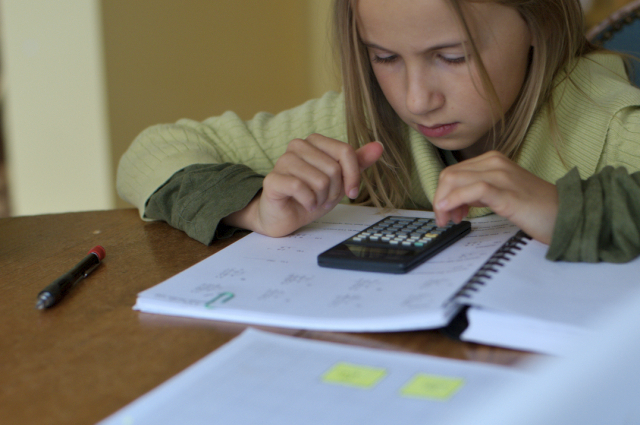
Celine checks her work with a calculator
It was Celine's request for more math that got me started down this path originally. As the oldest she is our guinea pig in everything. When she was younger I honestly hadn't given much thought to how or when I'd formally teach math to the kiddos. But I did scrupulously write down all the math learning we did do and capitalized on those teachable moments. Then around the time she turned 8 she requested more math so I figured the time was right to use structured lessons.
The other two have not had such a privilege of saying "I want to learn more math". I figure if I'm sitting down at the table while Celine does her math (we usually all sit at the dining room table together for "schoolish" acitivites) the other two can start, at an appropriate age and readiness, to join us for a few minutes (literally) of stuctured learning.
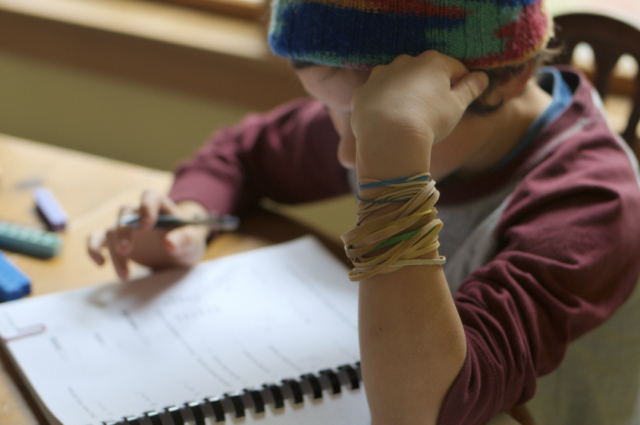
This is the story for each of our children:
- Celine, almost 11, is finishing up the Gamma level which I think is roughly grade 4 math?? I honestly don't know. It's basically everything to do with multiplication and a lot of measurements. We've been working on this particular book for almost a year and a half mostly due to a very long summer break last year (Is 4 months still considered summer break or spring & summer break?). She really gets math concepts and although she doesn't like learning new things (she wants to understand something without having to learn it first - don't we all) she overall doesn't mind the 30 minutes she spends 3 days a week working on it.
- Laurent, just turned 9, is working on Alpha which is grade 1/2?? Again, no clue. This is basic addition and subtraction. This isn't the first level in the curriculum, which is Primer, but he knew that stuff anyway so we just jumped into this level. Laurent does not like sitting for 15 minutes 3 times a week to do math. Or I should say he doesn't like it initially. With him, any interruption in his plans is met with discouragement, but not for long. He's an easy going kid so after 2 problems he's right into it. "Oh, this is easy" is a common refrain to hear from him.
- Brienne is 7 years old and hasn't started any curriculum math. Anytime she wants to join us she is free to do so and will from time to time do worksheets like a mad woman "more problems mama please". But her days of math freedom are coming to an end. After our April break she will start Alpha also and I suspect she is nearly at Laurent's level from sitting along side us as we've done the math together. She's ready for this even though she is feigning mortication at being required to sit down for a couple days a week to practice math.
A seasonal break
One thing that Celine and I have discovered is that long breaks from weekly math stimulation, ie: 4 months of spring/summer break, are too long. It's very difficult after this to bring your brain back to where you were at. So this season we're trying something new. We'll take a break for April, resume again in May and then take short summer breaks as needed but not longer than one month and we might even continue with weekly math practice right through a summer break. An hour or so per week is really not much.
The younger two will have more breaks this summer than Celine, she's at a different learning level and can handle the responsibility for her own math. But I've learned from experience that we won't stop for 4 months.
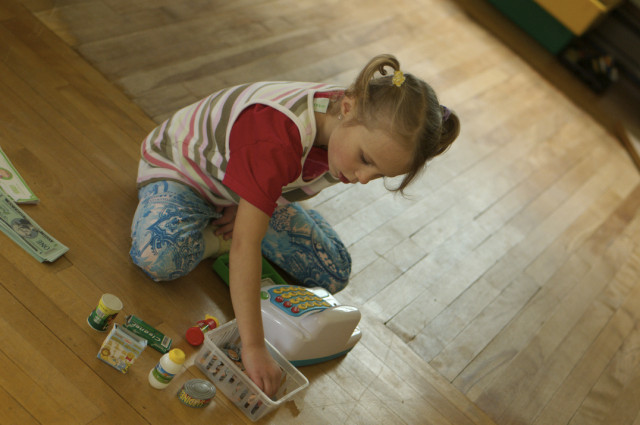
Brienne's store play with money
Everyday Math
We use the curriculum to assist our children in everyday math. The goal at this age is to understand life math and lay a foundation for further learning, not simply progress through a set curriculum. I want Celine to learn multiplication and measurements because you need those skills to be a good seamstress, something she is and she values.
We see math practice as giving our kiddos the skills they need to reach their goals. Though we roughly follow a curriculum we try to tie their math practice as much as possible to their everyday life and interests.
I won't go into all the ways we do that. There's too many to name. The kids do some kind of math each day, even if it's as simple as helping with meal prep measurements.
But I did want to mention a few games we like for simple enjoyment (that teach math skills also). We love card games, both regular deck and speciality cards. Racko is fun though I still have to partner with Brienne to help with ordering. Battleship is a favorite. The kids love chess (all of them play it) though I can't stand it. Dominos is great for teaching basic counting and numbers. Of course Lego is the perennial favorite and our math blocks also get used for building.
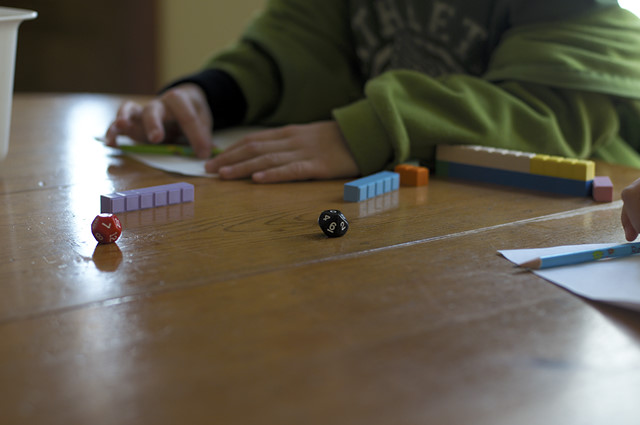
Recently we bought a mixed set of polyhedra dice and have had fun playing with those. Here's a great mixed level math game: Choose two different die. Roll die and have each player do a different computation with those numbers depending on their skill level. When we play Brienne has to add the numbers, Laurent subtracts and Celine multiplies. The kids play for the sheer fun of getting the correct answer, we don't compete though you could (and Brienne would probably prefer that).
Math Attitudes
I have to say initially I thought I was selling out on my ideals of relaxed interest-led learning by following a curriculum, however loosely, for math. But the reason we choose to do this was to help our children reach their goals, both short and long term.
There is nothing contrived about this and in actuality it is very relaxed and interest-led. The goal isn't to complete the curriculum, the goal is to move forward at whatever pace they are able to acquire skills needed for day-to-day living.
I think this is one reason there is no math anxiety in our home. Math isn't something you dread doing (unless it's taxes), it's just another part of life, like cooking the evening meal. Not to say there isn't frustration in the process. Sometimes there is and coming through that leads to a sense of accomplishment but there are no "math dummies" in our homeschool or "kids that just don't get it".
I've never heard the phrase "I'm no good at math" come from my children's lips. Math is interesting (the logic itself is a form of beauty), it helps us solve problems and reach our goals.
I think it's safe to say we like doing math and that the attitudes the kids are forming about math are more important than number of correct problems on a page or how fast they complete the unit.
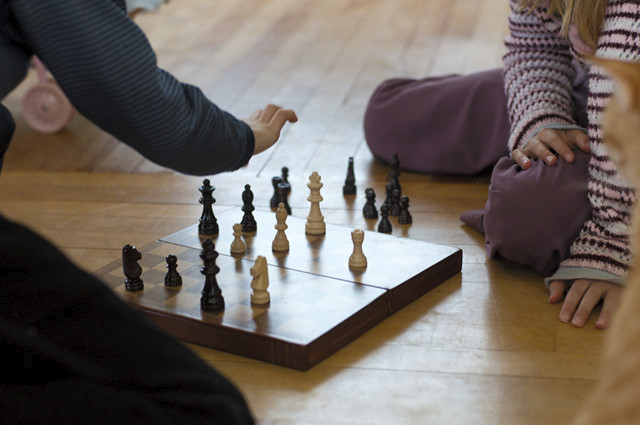
Further Reading:
Just have to add this last note. I am a huge fan of David Albert's homeschool writing. This is a great essay (humorous and encouraging) about teaching our kids math. Also, I've read somewhere in one of his books that a person can learn all the school years math (grades 1-12) in a couple weeks of intensive study if they so desire.
That's always intrigued me and I don't doubt it. If a person is motivated and ready to learn almost anything is possible. I looked for a link to that writing of his but couldn't find it. If anyone knows where to find it (book and page number or weblink) I'd love to know. (David Albert himself left the link for us all in the comments. Thanks David!)
How do you teach your kids math?
Post Update: Jamie, at Simple Homeschool wrote a post Curriculum Choices: Tackling Math that explains some other Math curriculum options.
Post-Post Update (03/12): Last summer, when our youngest two were 8 & 10 we switched them to Teaching Textbooks. They work at approximately the same grade level. This works better for our son especially who has difficulty reading. Our oldest daughter continues to use Math-U-See.
Filed Under
Resource Library
-

Kika on March 31, 2010, 9:40 p.m.
Renee, I like your focus on attitude in your home - as in attitude towards math or other learning. My husband and I have never presented math as an option b/c we feel it is extremely important and there are too many financially illiterate people in our society. Nor have we ever had any struggles with it. It is simply part of life and I try and help our kids see the practical applications of what they are learning. Granted, my son, at his higher level of math isn't convinced he'll ever really use what he is currently learning but even if it is 'jumping through a hoop' to get him to his goals, so be it. In the early years we like to engage in plenty of oral math questions which my kids have all enjoyed. Like you, we've used games, some CD roms, baking, playing store,learning how to separate their allowance (or other $) into categories (tithe/spend/save), and so forth as part of their math learning. I also use Saxon math and appreciate its no-nonsense format. We do just half the questions and I also allow the kids to start each year's book by only doing the exams (which come every four-five lessons depending on math level). If they can maintain a high average on the tests (whatever we and the child have decided together as the 'magic number') then they already know the material so they conintue this way until they hit unfamiliar concepts. This means no wasted time and has worked well in my home. In the earlier years they probably sat down to some (formal)math three-four times/week and the time gradually increases with age/level. We also like using logic workbooks/games (like Chess and Mindbenders, for instance). We frequently discuss our budget and reasons for spending/saving/giving the way we do; dangers of debt; and encourage our kids to develop skills which will allow them to make some money 'on the side' to help them through post-secondary studies, for instance.
-

renee on March 31, 2010, 11:54 p.m.
Kika, I've never asked before. How old are your kids? I too have no problems with older kiddos jumping through academic hoops, that have no immediate relevancy, to reach their goals. I jump through certain hoops (deadlines being one) to reach mine, it's just part of life. But I am choosing to do that and that's really what i want to give my kids - freedom to choose for themselves.
-

Kika on April 4, 2010, 2:53 a.m.
Hi Renee, my kids are turning five, ten and turning 14. The older two are advanced in their math - not on purpose, really, just worked that way in part due to the program we use and b/c they find it relatively easy. So my son will probably end up doing grade 10 math next year. He agrees that (higher level) math is potentially important to his future goals. On a bit of a different note, I wonder if sometime you'd entertain a discussion about cultural perspectives on education/homeschool. For instance, individuals who've immigrated from another country often have a harder time understanding a strictly interest-led approach to education. Not just b/c they've never experienced it but also b/c in their countries of origin education was supremely important - often the only way to guarantee an exit from poverty and therefore deem a university education for their own children of utmost importance. I'm trying to write quickly so hope the idea is clear enough?!
-

renee on April 4, 2010, 12:28 p.m.
Kika, That's a very interesting idea but I feel super unqualified to discuss, write about or host a discussion on that topic. I totally hear what you're saying though. I don't have any cultural experience other than my own (& my husband's) caucasian North American upbringing. Is this something you have experience in? (a different culture that is)
It's interesting because I too feel that education is very important, just education of a different kind. The kind of schooling I want to give my children that will prepare them for their future is different from that of someone in a different culture, to be sure. Because my husband and I think we live in a very fastly (that isn't a word) changing world we want our children to be creative, problem solvers who are good with both using their minds and their hands in practical life skills.
We have a bunch of other goals also but this is one that I see is different from "work hard, jump through educational hoops to get out of poverty" reality that many people face worldwide.
-

Kika on April 4, 2010, 9:37 p.m.
Yes, we are in this situation as my husband is African and the only one of his siblings to have 'escaped' poverty, through education. We homeschool (as you know) but I've always had to reign in on some of my "unconformist preferences" out of respect for him - and I trust that together we'll make wise choices for our children. I've wondered if there are others in my boat. I've recently discussed this idea with my brother's girlfriend - child of Chinese immigrants and see that this experience (as in coming to Canada to provide a 'better' life for one's own children) greatly colors one's approach to education (and life in general). I should say, too, that I have faith that God will direct us in the path to take for each of our children's education as we continue to seek Him.
-

Johanna Hanson on Sept. 27, 2012, 4:27 p.m.
I know this is a couple of years after the fact, but I am just reading this post and these comments and will definitely say yes--culture is a big part. The book Outliers covers this briefly.
My husband's mother is Chinese. He was raised somewhat Tiger Mom-ish. But her Chinese-Malaysian family saw education as their ticket not only to wealth, but also to get to the US. Interesting discussion. There is also a lot of unspoken pressure for our kids which makes following my instincts and research about how children learn best a little harder. Thankfully my husband is completely on board. :)
-
-
-
-
-
-

Alisha on April 1, 2010, 12:36 a.m.
We use Math U See for our guys, too. But I am having trouble with them actually learning their facts instead of relying on the blocks for all the answers. This is one of the most frustrating things we ram heads with in our schooling. Any ideas on how to make learning more fun in a situation such as ours? My oldest is massively Lego oriented, so anything in that respect would be much appreciated.
-

renee on April 1, 2010, 11:15 a.m.
Personally I would just keep letting them use the blocks. Eventually they won't be able to anymore because the level of math won't allow it, it will be too complicated for blocks.
You know I actually don't think about how to make learning fun or try to make it fun. Most of the time it is fun because it's very interesting and inspiring (talking about non-math stuff here). If we're not interested in what we're doing (collectively or individually) that's when the head butting comes up and I avoid that at all costs over their learning. There's enough in life to butt heads about.
That's why I like interest led learning. We follow our collective interests which take us all over - through history, around continents, through scientific discoveries of our own. Alternately we do inspired mommy & daddy learning. If Damien and I are inspired about something it's easier to pass along that enthusiasm and joy into what we are teaching our children.
oh boy this is becoming a post in and of itself. In fact I'd like to write about this sometime because it's interesting to talk about! I think there's this misconception that we should make learning fun and I don't agree. Learning in itself should be motivating, interesting and inspiring - those characteristics will make it fun and rewarding, not necessarily the subject matter itself. And in the case of math it's just something we do, like making supper. The fun in that comes from figuring out the answers and our whole family enjoys that (my husband and I both studied math and enjoy it).
Brother, I gotta stop now. Don't get me started talking about homeschooling, I can't stop.
-
-

kyndale on April 1, 2010, 3:18 a.m.
Hi Renee, since we kind of started in the middle of the year with Amelia, we haven't gotten any curriculum for her. But, we love Math U See and I would love to get it for them in the fall. I do agree that the summer is way too long to not get the practice. I'm planning on doing some math at least once a week with them. Or whenever we think about it! Thanks for such a long and thoughtful post on the subject of math! xo Kyndale
-

renee on April 1, 2010, 11:16 a.m.
It is long but I have so much to say! I am really jazzed about learning theories and homeschooling my kids it's hard to keep it all in and try to edit it down to make it more readable. I'm glad you made it through (or at least skipped the parts that weren't of interest to you).
-

kyndale on April 2, 2010, 5:26 p.m.
I appreciate long posts. I really do. I read all of it and am jealous that you can spend the time to make it thorough. Have a great weekend Renee! :) Kyndale
-
-
-

Alisha on April 1, 2010, 2:41 p.m.
Ooooh, please do write a post about this! I am very interested! We mainly do interest-led learning in other areas, but math kicks my backside. I was terrible at it and I don't have a lot of confidence teaching it myself, hubby's schedule doesn't fit for his math expertise, so it's me. I don't want to send my little men out there finger-counting into the world.
I love your homeschool posts! I live too far away to actually do any meshing with my homeschool group other than talking online, so my homeschool mom bloggers are my lifeline to keeping my sanity... well, what's left anyway. :)
-

Earth Mama on April 1, 2010, 4:08 p.m.
I love how you mention not starting anything till your daughter was 8. That's where I'm at. My oldest is 9 1/2 now, but I think it's okay to wait as long as you need to. I definitely will check out the Math U see. I like things that have manipulatives to help soak in any lessons. Thanks for sharing your resources.
:)Lisa
-

lolo on April 4, 2010, 5:55 a.m.
Just wanted to add that my boys LOVE Math-u-see also! As a matter of fact, we were working with the blocks yesturday, and my 8 and 6 year olds exclaimed...Mom, you make math really fun! That is NOT a comment they give lightly! I must say,though..I like to use the blocks and make up my own curriclum with them...we personalize story problems, or place value reading for building, My boys are very "lego oriented" so we bring them in also.....have you ever tried making story problems run together so that your kids can actually build a high=rise N.Y. apartment with legos? Mine made this up when they realized there were not enough Math-u-see blocks to accomplish this! I never "got" math,either...but I get it now with those silly blocks...YIPPEE! Keep those posts of your "long" and thought provoking....they really inspire me, thank you!
-

renee on April 4, 2010, 12:31 p.m.
Thank you Lolo. I do wonder about really long posts. I like writing them because I want to be thorough but I don't want to be long winded or boring either.
-
-

Jimmie on April 5, 2010, 9:40 a.m.
I like your approach a whole lot! :-) I understand the need for some type of curriculum to use as a framework. I use a mix of created hands-on and games with book curricula.
-

David Albert on April 30, 2010, 3:54 a.m.
Here's the link:
Just Do the Math!
The Sudbury link has now been taken down, but you'll find it in one of Dan Greenberg's books.
Best - david 'have fun. learn stuff. grow.'
-

Mike on Aug. 19, 2010, 8:23 p.m.
Math-Aids.Com is a free resource for teachers and parents. You can make an unlimited number of printable math worksheets for children, the classroom or homework practice. The answer key is included with each math worksheet as it is created. The worksheets are randomly generated so when you request one it will be different every time. Each math topic has several different types of math problems so you may choose which area to focus on in that subject.
I have built a special section just for Multiplication Math Topics. These topics include Times Tables, Single and Multiple Digit Multiplication, Missing Factor, Decimal and Negative Number Multiplication Worksheets.
I will be glad to add any topic that you may need.
Here is the link:
Multiplication Worksheets
Please consider adding a link on your site for you and your readers.
Thank you very much.
-

Leslie on Sept. 2, 2010, 7:20 p.m.
Just linked over to this from your summer school post. Wow, I've been needing to read this. I am really struggling with math right now. I bought a curriculum called Horizons and it has been a real disappointment. It came with a huge box of math "manipulatives" it said, which turned out to be just different sets of flash cards. I'm really disappointed with it. It has turned out to be such a frustration for me and my son I have totally put it away and we're just doing our own thing. This week we've been doing math with m&ms which has been a huge hit. But I'm pretty much at a loss for knowing what to do. My son is 7 1/2 and in first grade. I also have a 5, 3 and 10 month, who enjoy "participating" in their own way, but nothing is required of them. You mentioned that you use Math U See, would you recommend that as a curriculum overall? I was interested, too, in how you wait until 8 for a curriculum and required math time. Loving your thoughts here, thanks for taking the time to write out your thinking, it really helps!!
-

renee on Sept. 6, 2010, 1:40 p.m.
Leslie,
I have no experience with Horizons and I don't know anyone who uses that method either.
I do recommend Math U See for a math curriculum because it has worked for our family. But I know for other families it hasn't worked. I have friends who have given us their materials as they found programs that worked better for them - Teaching Textbooks in their case.
I didn't start formal math instruction with my oldest till she was 8. Our younger two started at 7.5 and 7 since their older siblings were already doing it and it wasn't hard to incorporate them into it. I don't have hard and fast thoughts about timelines for children's learning. We introduce things when it seems our children are ready and when it works for our family. When my oldest was 6 (the time you might usually start school stuff) my other kids were 2 & 4 and we were very much in toddler mode. So we did a lot of field trips and reading. I didn't have time to sit down and teach her math and she wasn't all that interested so I figured "what's the rush?" She did learn to read at that age and my husband taught her, I didn't have the time (or interest in the program we were using).
Anyway, all of that to say this: I don't believe in a magic age. Our family didn't start formal math lessons till our kids were 7 & 8 simply because that worked best for my time available and kid's interests.
Stay tuned because I will be writing reading and writing posts sometime this fall. Reading, writing and math is about the extent of our children's "schooling" at this stage.
-

Leslie on Sept. 6, 2010, 4:11 p.m.
Thanks, Renee, for the thoughtful reply! It helps so much - seriously blogs like yours and others a lifeline to me as I'm finding my way in this first year of homeschooling. blessings on your day :)
-
-
-

Leslie on Sept. 2, 2010, 7:21 p.m.
um, ok, just noticed your little bookshelf down below- I'm reading out to canaan right now too. it's so peaceful, i'm enjoying the series!
-

Natalia on Sept. 16, 2010, 10:26 a.m.
Great post (and great blog - have just discovered it). I am another one working my head around interest lead learning and the need for some structure (my son is currently in school, but we are working out arrangements for 'flexi-schooling' or home learning in the next month). My son currently loves numeracy/maths, and will happily do worksheets. But not all kids are like this. And what if he is not like this in future? So there has to be a balance between 'making' kids learn the core skills they need to be able to explore the topics that interest them, and also give them the skills to negotiate later life.
And thanks for saying this: 'But I will say this, I believe it's totally possible to learn math in a completely "natural" setting, sans worksheets, workbooks and practice problems. I just don't have the mental energy to invest in that method. That requires more "here kids, let's measure the area of this garden plot" than I am able to accomplish.' I feel exactly the same way! I have no problem with other people who do it (if they do it well of course) but I know my limits, and one limit is I am just not going to invest the effort required to do a good job of it.
-

Spalva on April 15, 2011, 12:23 p.m.
I remember being quite encouraged by Albert's article on math when I was about halfway through unschooling my eldest's 4th grade year. We hadn't touched math all year -- and we never did, in the end, besides the real-life stuff. This daughter decided to return to school for 5th grade. She entered an international school following the baccalaureate program. Her scores on the math entrance were dismal -- mainly because she is not a good tester. Well, she went from scoring something like 13 on her first classroom math test to regularly scoring 73-85s. They have covered division, fractions and algebra this year -- when she could barely multiply anything when she started. She is especially good at problem-solving and algebra (declares that she looooves algebra). She regularly says things like, "I can see how this might be useful in my life." I think that's her unschooling background despite having completed several years of schooling.
It's interesting to read how others approach math. I don't get the blocks and neither does my daughter, despite being a visual learner. But she told me something interesting about this visualness that I didn't know. She says when she's doing a math test she can see the scene of us learning it together and that's how she remembers.
Anyway, I sure am spending time here yesterday and today writing long comments. Off to finish making the doughnuts and to clean the bathrooms!
-

renee on April 15, 2011, 5:43 p.m.
homemade donuts... wow. It's so interesting how unique everyone is in how they learn. I love it (the unique-ness that is).
-
-

Julia on Feb. 25, 2013, 6:04 p.m.
You might find the resources on my web site helpful for all K-12 grade levels. I have aligned everything to the core curriculum and it's all free.
-

Dads Worksheets on Dec. 22, 2016, 11:08 p.m.
Hi Renee -
Wow... I thought I was getting a lot out of this article, until I started reading the comments. All good stuff. I'm definitely headed to David Albert's site next to try to start figuring out how to speed up the learning process. I'm restarting with 6 y/o and and 8 y/o girls after having launched two much older girls, and all of it feels new and the same all at once. And maybe just a bit more intimidating than it should.
I did want to pass along my math website in case you or any of the other readers here were looking for more math resources (or worksheets to fill those gaps between garden-plot measuring expeditions :-)...
Math Worksheets at DadsWorksheets.com
I have a pretty thorough set of multiplication worksheets from my "round one" experience that I'm in process of improving and updating, but I've also have been adding interactive math calculators that attempt to provide more details than just the bare answers... The fractions calculator is probably my current favorite, but much more in the works.
Regardless, thanks for this post. I read it twice and I'm still exploring everything you linked to.
Best wishes,
Jim
You can subscribe to comments on this article using this form.
If you have already commented on this article, you do not need to do this, as you were automatically subscribed.






daffodil lane on March 31, 2010, 3:44 a.m.
I am really interested in your reading post. I have been a big fan of making reading pleasurable, never a dreaded chore. For my son, that meant Lego magazine and Captain Underpants. Yesterday though I was talking to a teacher at our co-op, and she recommended that he should be doing a sequential reading program. (She doesn't teach him, just her input from what I explained about his reading skills.) I would love to hear other's approaches for reading. I am not sold on a progran nearly as much as I am just time spent reading - aloud by me or independantly, with great books, in a comfy place. I wonder if I am missing something though.
Kika on March 31, 2010, 9:52 p.m.
I do not believe you need a 'sequential reading program'; I agree with you that encouraging a love of reading, continuing to read aloud to your child, and having him sometimes read aloud to you are all easy, natural and will allow your child to become a capable reader. I would bring tons of books home from the library, according my kid's intersts (and used book lists for ideas too)and my kids wanted to read. Sometimes they'd want to read "hard" books so I'd read lots of it and they'd read the words they could. Sometimes they spent months reading quite easy material and then they'd be ready to try something more challenging. At times they chose to borrow sequential readers from the library but they're sooo boring! With my middle daughter I chose to do a few reading comprehension tests and learned that she had trouble answering comp. questions unless she'd read the material for herself (strong visual learner) and this was helpful to me, but it didn't help her learn to read. If my older kids ever seem to 'get stuck' I help them find new, interesting reading material but I think it is healthy that they read from a variety of sources (ex. Lego magazine, wikipedia, classic novels) Now, my youngest has informed me she's ready to learn to read (she's four) and we're approaching things the same way. Have fun!